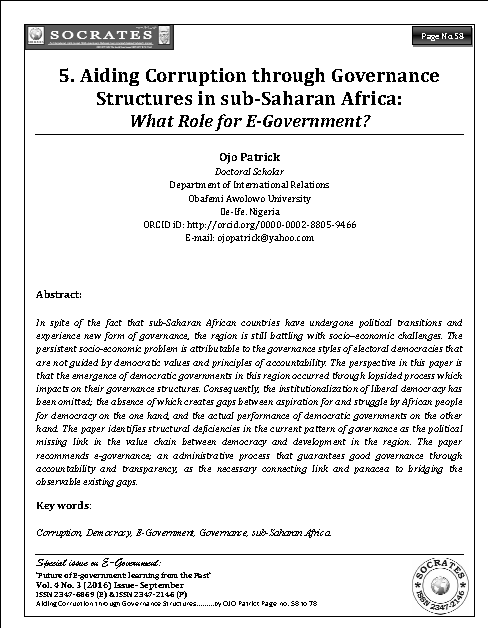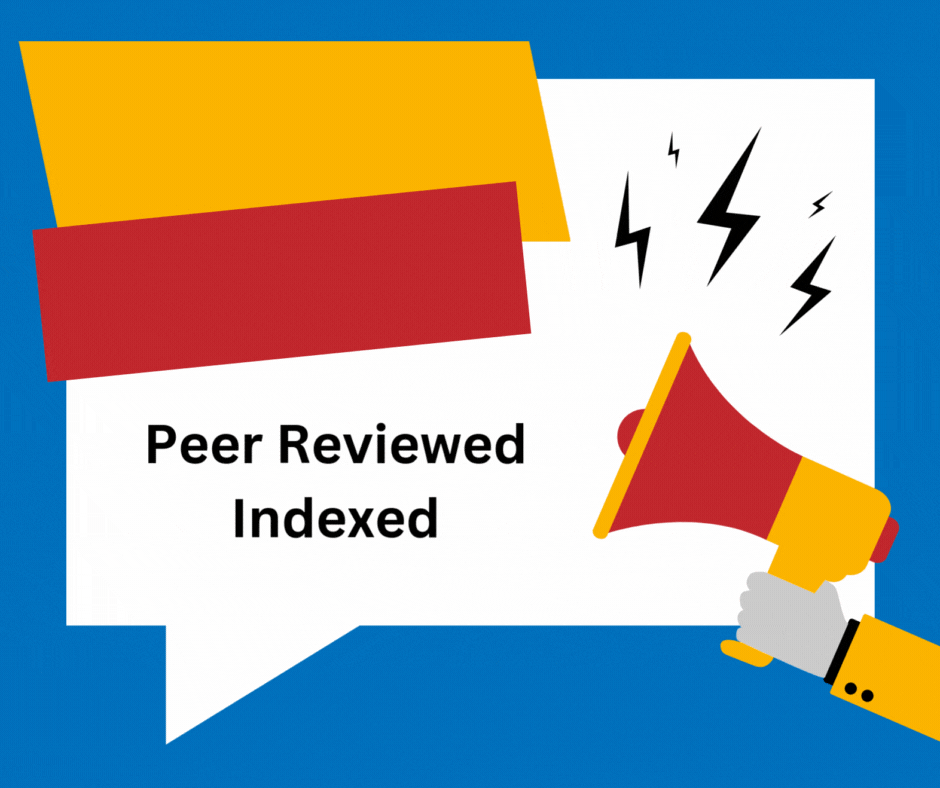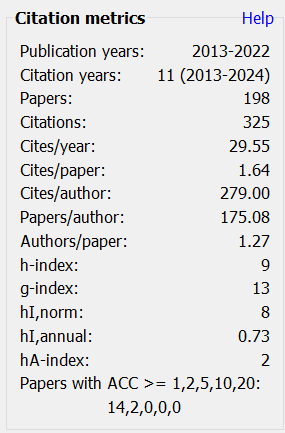Aiding Corruption through Governance Structures in sub-Saharan Africa
What Role for E-Government?
Keywords:
Corruption, Democracy, E-Government, Governance, sub-Saharan AfricaAbstract
In spite of the fact that sub-Saharan African countries have undergone political transitions and experience new form of governance, the region is still battling with socio–economic challenges. The persistent socio-economic problem is attributable to the governance styles of electoral democracies that are not guided by democratic values and principles of accountability. The perspective in this paper is that the emergence of democratic governments in this region occurred through lopsided process which impacts on their governance structures. Consequently, the institutionalization of liberal democracy has been omitted; the absence of which creates gaps between aspiration for and struggle by African people for democracy on the one hand, and the actual performance of democratic governments on the other hand. The paper identifies structural deficiencies in the current pattern of governance as the political missing link in the value chain between democracy and development in the region. The paper recommends e-governance; an administrative process that guarantees good governance through accountability and transparency, as the necessary connecting link and panacea to bridging the observable existing gaps.
Downloads
Metrics
References
Ake, C. (1996) Democracy and Development in Africa. Washington, DC: The Brookings Institution; Diamond,
Awuwo A (2008) Constructing the democratic developmental state in Africa: a Case Study of Nigeria, 1960-2007. Johannesburg: Institute for Global dialogue
Bratton Michael and Robert Mattes (1999) “support for democracy in Africa: intrinsic or instrumental? Afrobarometer Paper no. 1 (April), pp. 1-44
Bratton, Michael (2002) “Wide but Shallow: popular support for democracy in Africa” Afrobarometer Paper no 19 (August) pp 1-25
Bratton, Michael and Nicolas van de Walle (1997) Democratic Experiments in Africa: Regime transitions in comparative perspectives. Cambridge: Cambridge university press
Bwalya, K. Joseph (2009) “Factors Affecting Adoption of e-Government in Zambia”, The Electronic Journal of Information Systems in Developing Countries, vol. 38, no. 4, pp. 1-13
Chan, Sylvia (2002) Liberalism, Democracy and Development. Cambridge: Cambridge University Press
Clark, Spiro Elizabeth (2000) “Why Elections Matter” Journal of Democracy, vol. 23, no. 3, (Summer), pp. 27-40.
Coleman, S. (2006) African e-governance: opportunities and challenges. Oxford: Oxford University Press;
Denhardt, Robert and Janet Denhardt, (2000)”The New Public Service: Serving rather than Steering” Public Administration Review vol. 60, no. 6, pp. 549-559
Diamond Larry Jay (2002) “Thinking about Hybrid Regimes” Journal of Democracy, vol. 13, no2, (April) pp. 21-35
Diamond, Larry (2008) The Spirit of democracy: the struggle to build free societies throughout the world. New York; Henry Holt Books
Donnelly, J (1999) ‘Democracy, Development and Human Rights’ Human Rights Quarterly, vol. 21, no 3, pp. 608-632
Edigheji, Onamo ed. (2010) Constructing a Democratic Developmental State in South Africa: potentials and challenges Cape Town: HSRC Press
Ekanade, O. Victor (2014) “The Dynamics of Forced Neoliberalism in Nigeria since the 1980s”, Journal of Retracing Africa, vol. 1, no. 1, (February), pp. 1-24.
Fasenfest, David (2010) ‘Government, Governing and Governance’ Critical Sociology, vol. 36, no. 6, pp. 771-774
Finer, S (1970) Comparative Government Harmondsworth: Penguin Books
Fink, C. and C. J. Kenny (2003) “Whither the Digital Divide” Info, vol. 5, no. 6, pp. 15-24
Fukuyama, Francis (2013) “What is Governance” Working Paper 314, Washington, D.C: Center for Global Development, p. 3.
Gay, John and Thuso Green (2001) “Citizen perception of democracy, governance and political crisis in Lesotho” afro barometer paper no 13, (October) PP 1-32
Gerring, John, Philip Bond, William T. Barndt, and Carola Moreno (2005) “Democracy and Economic Growth: A Historical Perspective”, World Politics, 57 (April), pp. 323-364
Gershman, Carl (2005) “Democracy as policy goal and universal value” The Whitehead Journal of Diplomacy and Interactional Relations (Winter/Spring), pp. 19-38
Hadenies, A (1992) Democracy and Development. Cambridge Cambridge University Press
Halperin M.H, Siegle J.T and Weinstein, M.M) (2004) The Democracy Advantage: How Democracies Promote Prosperity and Peace. New York Routledge
Heeks, Richard (2001) ‘Understanding e-governance for development’ I-government Working Paper Series no. 11, Manchester Institute for Development Policy and Management
Huntington, Samuel (1991) The Third Wave: Democratization in the Late Twentieth Century. Norman: University of Oklahoma Press.
J.A. & Limongi F. (2000) Democracy and Development: Political Institutions and Well-Being in the World 1950-1990. Cambridge: Cambridge University Press
Kaifeng and Callahan, 2007 op cit.: differentiates four categories of participation: citizen action, citizen involvement, electoral participation and obligatory participation. This paper is interested in the second category
Kaifeug, Yaug and Kathe Callalian (2007)” Citizen Involvement Efforts and Bureaucratic Responsiveness: Participatory values, Stakeholders Pressures and Administrative Practicality”, Public Administration Review, vol. 67, issue 2 (March/April), pp. 249-264
King, Cheryl S., Kathryn M. Feltey and Bridget Susel (1998)”The Question of Participation: Toward Authentic Public Participation in Public Administration”, Public Administration Review, vol. 58, no. 4, pp. 317-326
Landman, Todd (2006) “Democracy and Human Security: Essential Linkages” Democracy, Conflict and Human Security. Stockholm: IDEA, pp. 13-24
Larry (2005) “Democracy, Development and Good governance: the inseparable links”, Annual Democracy and Governance Lecture. Accra: Center for Democracy and Development; Przeworski A, Alvarez M.E, Cheibub
Layton, T. (2007) Information Security: Design, Implementation, Measurement and Compliance. Boca Raton, FL: Auerbach Publications.
Levitsky, Steven and Lucan A. Way (2010) Competitive Authoritarianism: Hybrid Regimes after the Cold War. Cambridge: Cambridge University Press
Lewis, Peter (2008) “Growth without prosperity in Africa” Journal of Democracy, vol 19, no 4, pp. 95-109
Linz J. Judan and Stepan A. (1996) Problems of Democratic Transition and Consolidation: Southern Europe, South American and post-Communist Europe. Baltimore, the Johns Hopkins university press, p. 5
Mangesh, Anjah (2014) “Democracy and Sustainable Development” Journal of Humanities and Social Science, vol. 19, no 11 (November) pp. 40
Masaki, Takaaki and Nicolas van de Walle (2014) “The impact of democracy on economic growth in sub-Saharan Africa, 1982-2012” WIDER Working Paper 2014/057.
Mcfaul, Michael (2004) democracy promotion as world value” The Washington quarterly, vol. 28, No 1, pp. 147 -163
Mcferson, Hazel M (1992)”Democracy and Development in Africa” Journal of Peace Research, vol. 29, no. 3, (August), p. 24
Monga, A. (2008)”E-Government in India: opportunities and challenges”, Journal of Administration and Governance, vol. 3, no. 2, pp. 16-26
Mutula, S. (2012)”E-Government’s role in poverty alleviation: case study of South Africa” in R. Lekoko & L.Semali eds., Cases on Developing Countries and ICT Integration: Rural Community Development, pp. 104-122
Mutula, S. and J. Mostert (2010)’Challenges and opportunities of e-government in South Africa”, The Electronic Library, vol. 28, no. 1, (February), pp. 38-53
Ndikumana, Leonce and James K. Boyce (2003) “Public Debts and Private Assets: Explaining Capital Flight from Sub-Saharan African Countries”, World Development, vol. 31, no. 1, (January), pp. 107-130
Nikita Yadav and V.B Singh (2012) “E-Governance Past, present and future in India” International Journal of Computer Application, vol. 53, no 7 (September) pp. 36-48
Nkwe, Nugi (2012) “E-Government: Challenges and Opportunities in Botswana” International journal of Humanities and Social Science, vol. 2, no 17 (September), pp. 39-48
Ojo O, Patrick, Friday Aworawo and Ifedayo Elizabeth (2014) “Governance and the challenge of socio-economic development in Nigeria” Journal of Sustainable Development, Law and Policy, vol. 3, no. 1, pp. 132-148
Ojo O. Patrick (2015)”From Rhetoric to Reality: Bridging the gap between Aspiration for Democracy and Governance Performance in Nigeria and South Africa”, in N. Andrews et al. (eds) Millennium Development Goals (MDGs) in Retrospect: Africa’s development beyond 2015. Switzerland: Springer, p. 281
Olsan Mancur (1993). “Dictatorship, Democracy and Development” The American Political Science Review, vol. 87, no. 3, (September), pp. 567-576
Osaghae, Eghosa E. (2005) “The State of Africa’s Second Liberation” Interventions: International Journal of Postcolonial Studies, vol.7, no. 1, pp. 1-20
Osborne, David and Ted Gaebler (1992) Reinventing Government. Reading MA: Addison Wesley, p. 283
Pathak, R.D., Gurmeet Singh, Rakesh Belwal, Rafia Naz and R.F.I. Smith (2008) “E-governance, corruption and public service delivery: A comparative study of Fiji and Ethiopia”, JOAAG, vol. 3, no. (January), pp. 65-79
Patrick, O., Mathew Olusola, O., & Vincent Alaba, E. (2016). From Political Transitions to Good Governance in Africa: Resolving the Socio-Economic Roots of Insecurity in the 21st Century.. S O C R A T E S, 3(4), 76-96. Retrieved from http://www.socratesjournal.com/index.php/socrates/article/view/182
Petithomme, Mathiew (2010) “The effects of leadership strategies on underdevelopment in sub-Saharan Africa: A comparative perspective”, African Journal of Political Science and International Relations, vol. 3, no. 4, (March), pp. 083-095.
Pillay, Soma (2004) “corruption- the challenge to good governance: a South African perspective” International Journal of Public Sector Management vol. 17, issue 7 (December) pp. 586-605
Rhodes, R.A.W. (1996)” The New Governance: Governing without government” political studies, XLIV, pp. 652.
Ribadu, Nuhie (2007) “Nigeria’s struggle with corruption” Paper presented to the Congressional House Committee on International Development. Washington DC: Congressional Briefing
Riley, Thomas (2012) “ICT and Governance: E-Governance vs E-Government”, available at http: //www.cips.org.in/public-sector-systems-governments-nnovations/documents/E_Governance_vs_E_Government.pdf.
Rose-Ackerman, S. (1999) Corruption and Government: Causes, Consequences and Reform. Cambridge: Cambridge University Press
Sachikonye, Lloyd M (2002) Democracy Sustainable development and poverty; are they compatible? Development policy management forum (DPMF) Occasional Paper no 2 p 4 available at http”//www.dpmf.org/occasionalpaper2
Schachter, H. (1995)”Reinventing Government or Reinventing Ourselves: Two Models for Improving Government Performance”, Public Administration Review, vol. 55, no. 6, pp. 530-537
Schuppan, Tino (2009) “E-Government in developing countries: Experiences from sub-Saharan Africa” Government Information Quarterly, vol. 26, no. 1, (January), pp. 118-127
Sebudubudu, David (2010)’Issues and Challenges in Democratic Governance in Africa: The case of Botswana’ Paper presented at the conference on Governance Reform: What is the Record? Perspectives from the South and North on Governance, Policy Space and Democratic Processes, The University of Quebec, Montreal, Canada. March 24-28
Seligson, Mitchell A (2002) “the impact of corruption on regime legitimacy; A Comparative study of four Latin American countries” The Journal of Politics, vol. 64, no 2 (May), pp. 408-433
Sen, Amartya (1999)” Democracy as universal value”, Journal of democracy, vol. 10, no. 3, pp. 3-17,
Shim, Dong Chul. and Tae Ho Eom (2008) “E-Government and Anti-Corruption: Empirical Analysis of International Data”, International Journal of Public Administration, vol. 31, no. 3, (February), pp. 298-316
Simbine, A.T (2000) “Citizen’s disposition towards governance and democratic rule in Nigeria” NISER Monograph series no 15
Thomas, John (1995)Public Participation in Public Decision. San Francisco, CA: Jossey-Bass
United Nations Development Programme (2006) The 2006 Human Development Report—Beyond scarcity: power, poverty and the global water crisis. New York: UNDP
United States Institute of Peace (USIP) (2010) “Governance Corruption and Conflict’ Washington D.C USIP
USAID (2013)’Transparency and accountability: regional agricultural trade environment’ (RATE) Summary. Washington DC, USAID, p. 4
Wamukoya, J. and S. M. Mutula (2005)”E-records management and governance in east and southern Africa”, Malaysian Journal of Library and Information Science, vol. 10, no. 2, (December), pp. 67-83
Weyland, Kurt (1998) “The politics of corruption in Latin America” Journal of Democracy, vol. 9, no 2, pp. 108-121
Williams, Robert (1999) “The New Politics of corruption” Third World Quarterly vol. 20 no 3, pp. 487-489
World Bank (1989) From crisis to sustainable growth in sub-Saharan Africa: A long term perspective study Washington, DC: The World Bank
World Bank (1992) Governance and Development. Washington D.C; Word Bank
World Bank (2012) “E-Governance”, available at: www.worldbank.org
World Bank (2016) World Development Report 2016: Internet for Development Framework for e-governance in UNDP. Washington, D.C: World Bank, available www.worldbank.org/publications/world-development-report/2016 pdf
Zack-Willaims, A.B (2001) “No democracy, No Development: Reflections on Democracy and Development in Africa”, Review of African Political Economy, vol. 28, no. 88, (June), pp. 213-223
Zakaria Fareed (1997) “the Rise of Illiberal Democracy” Foreign Affairs, vol. 76, no 6 (November / December) pp. 22-43

Downloads
Published
How to Cite
Issue
Section
License
Revised Copyright/CC license that applies to all the articles published after 05-02-2017
Attribution-NonCommercial 4.0 International (CC BY-NC 4.0)

Copyright/CC license that applies to all the articles published before 05-02-2017
Attribution-Non Commercial-No Derivatives 4.0 International (CC BY-NC-ND 4.0)

Author(s) will retain all the right except commercial and re-publishing rights. In the case of re-publishing, they will have to obtain written permission from the journal. Additional licensing agreements (Creative Commons licenses) grants rights to readers to copy, distribute, display and perform the work as long as you give the original author(s) credit, they can not use the works for commercial purposes and are not allowed to alter, transform, or build upon the work. For any reuse or distribution, readers and users must make clear to others the license terms of this work. Any of these conditions can be waived if you get permission from the copyright holders. Nothing in this license impairs or restricts the authors’ rights. To view a copy of this license, visit http://creativecommons.org/licenses/by-nc-nd/4.0/ or send a letter to Creative Commons, 171 Second Street, Suite 300, San Francisco, California, 94105, USA.
Research Papers published in SOCRATES are licensed under an Attribution-NonCommercial-NoDerivatives 4.0 International (CC BY-NC-ND 4.0)












